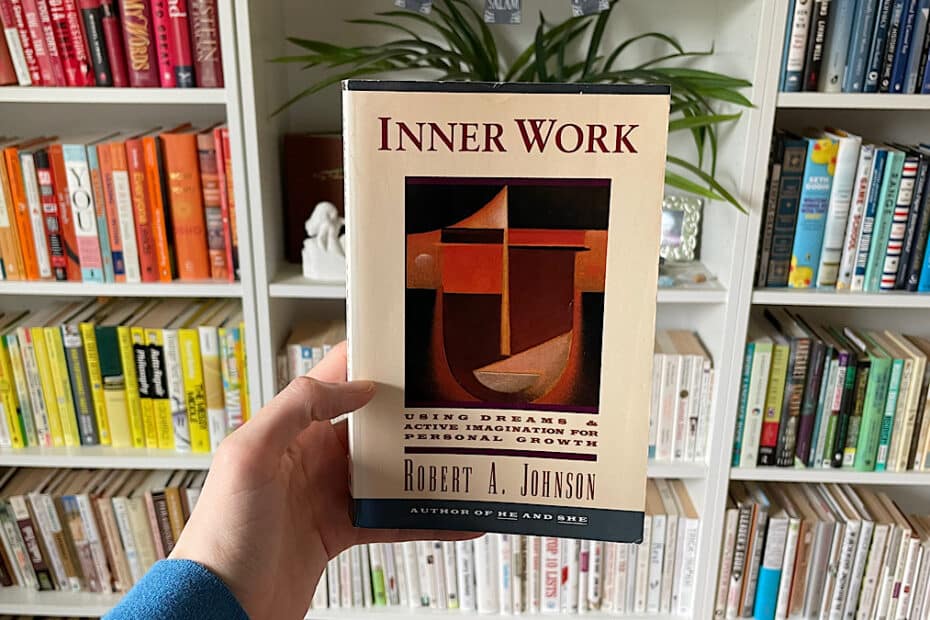“‘These are my dreams! Why live if I abandon them in difficulty? That is when they need me the most.’ Have you ever said those words? Have you ever accessed the victorious spirit within? Because here’s the secret: it’s resting within you, right at this very moment.”
Bert R. Mandelbaum, MD, via The Win Within (Page 35)
“When you have a dream that seems to be significant—maybe violent, nightmarish, but you feel that there is some import in it—in the morning, or even in the middle of the night, before you forget the dream, sit in your bed and close your eyes. Befriend the dream; just tell it, ‘I am with you, and I am ready to come to you. Lead me wherever you want to lead me; I am available.’ Just surrender to the dream. Close your eyes and move with it, enjoy it; let the dream unfold. You will be surprised at what treasures a dream is hiding, and you will see that it keeps on unfolding.”
Osho, Everyday Osho (Page 152)
37 Robert A. Johnson Quotes from Inner Work To Convince You Dreams Aren’t Arbitrary
Excerpt: Dreams are NOT arbitrary. Dreams are a primary means of communication. Not convinced? These 37 quotes from Inner Work should change your mind.
Read More »37 Robert A. Johnson Quotes from Inner Work To Convince You Dreams Aren’t Arbitrary
“When a huge number of fantasies flood your mind, it often means that you haven’t been giving enough attention to the unconscious. It compensates your imbalance toward the outer world by flooding you with fantasy—which forces you into a kind of involuntary inner life.”
Robert A. Johnson, Inner Work (Page 169)
“When you have a recurring fantasy that stays in your mind all day, it indicates that there is some inner problem that needs to be worked through.”
Robert A. Johnson, Inner Work (Page 169)
“The dream forced me to realize that the most important thing in life to me is friendship and feeling-exchange with other people. I don’t need to have many acquaintances, but I require good friendships that involve a deep level of communication, whether it be an exchange of ideas or the simple joy of being together.”
Robert A. Johnson, Inner Work (Page 133)
“It is not a good idea to try to make a ritual out of talking about your dream or trying to explain yourself to people. Talking tends to put the whole experience back on an abstract level. It gets contaminated with your desire to present yourself in the best light. Instead of a vivid, private experience, you wind up with an amorphous, collective chat. The best rituals are physical, solitary, and silent: These are the ones that register most deeply with the unconscious.”
Robert A. Johnson, Inner Work (Page 99)
“Opt for the interpretation that teaches you something new, rather than one that seems to confirm your ingrained opinions and prejudices. remember, the main function of a dream is to communicate something to you that you don’t know, that you are unaware of, that lives in the unconscious. Your dream will not waste your time by telling you what you already know and understand; therefore, you should choose the interpretation that challenges your existing ideas rather than one that merely repeats what you already think you know.”
Robert A. Johnson, Inner Work (Page 94)
“This is probably the single most important principle in dream work—the one that determines whether you will find the wisdom in your dreams. We have to recognize that dreams are intricate tapestries of symbolism, and each image represents something going on within our own selves.”
Robert A. Johnson, Inner Work (Page 69)
“The unconscious has the habit of borrowing images from the external situation and using those images to symbolize something that is going on inside the dreamer. Your dream may borrow the image of your next-door neighbor, your spouse, or your parent and use that image to refer to something inside you.”
Robert A. Johnson, Inner Work (Page 68)
“If you take your dreams as a reflection of the unconscious dynamics within you, you are most likely to get to the heart of the matter; if, however, you apply the dream on the external level, it usually turns out to be superficial. It is on the inner level that you can change life-patterns most profoundly; it is at the inner level that your dream is usually aimed.”
Robert A. Johnson, Inner Work (Page 67)
“Our culture teaches us to focus on the external world, so we jump to the conclusion that our dreams are talking about something on the outside. This is a collective prejudice we suffer from: We spontaneously assume that only the outer world has any importance. The true significance of the inner world becomes more clear when we begin to realize that almost everything we do, every reaction we have, every decision we make, every relationship we form, ultimately results from our inner qualities and inner dynamics. Everything is controlled by the huge energy systems that propel us from within, that determine most of what we think and do.”
Robert A. Johnson, Inner Work (Page 67)
“There was an old tradition in the Christian Church that one had not prayed unless one’s lips had moved. This idea expresses a psychological truth: Something physical has to happen. This is why it is so important that you write your examples down on paper. When you physically write those examples, the connections with your dream become clear and definite.”
Robert A. Johnson, Inner Work (Page 66)
“How the shadow appears in a dream depends on the ego’s attitude. For example, if a man’s attitude is friendly toward his inner shadow, and he is willing to grow and change, the shadow will often appear as a helpful friend, a ‘buddy,’ a tribal brother who helps him in his adventures, backs him up, and teaches him skills. If he is trying to repress his shadow, it will usually appear as a hateful enemy, a brute or monster who attacks him in his dreams. The same principles apply to a woman. Depending on her relationship to her shadow, she may appear as a loving sister or as a frightful witch.”
Robert A. Johnson, Inner Work (Page 50)
“Even a short, seemingly insignificant dream tries to tell us something that we need to know Dreams never waste our time. If we take the trouble to listen to the ‘little’ dreams, we find that they carry important messages.”
Robert A. Johnson, Inner Work (Page 44)
“Since dream images make no sense in ordinary terms, people dismiss them as ‘weird’ or meaningless, but actually, dreams are completely coherent. If we take the time to learn their language, we discover that every dream is a masterpiece of symbolic communication. The unconscious speaks in symbols, not to confuse us, but simply because that is its native idiom.”
Robert A. Johnson, Inner Work (Page 20)
“The world of dreaming, if we only realized it, has more practical and concrete effect on our lives than outer events do. For it is in the world of dreaming that the unconscious is working out its powerful dynamics. It is there that the great forces do battle or combine to produce the attitudes, ideals, beliefs, and compulsions that motivate most of our behavior.”
Robert A. Johnson, Inner Work (Page 19)
“Each dream communicates information that isn’t know consciously by the dreamer. It therefore takes some real effort, some stretching of our capacities, to get a hold on what the dream is saying. If the interpretation comes too easily, it is not likely to be as accurate or as deep.”
Robert A. Johnson, Inner Work (Page 15)


